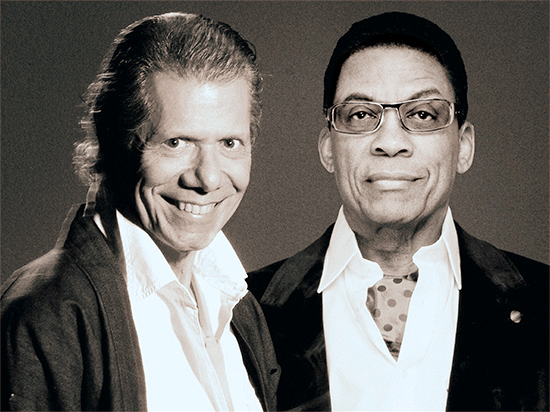They just don’t make jazz artists like Chick Corea and Herbie Hancock anymore. Both are jazz-piano legends in their mid-70s, both had major crossover successes, and both are still on the road—on this tour, playing duets for the first time since 1978. And while most of their peers are relegated to tiny jazz clubs, Corea and Hancock will perform at the 2,800-capacity Paramount to start a six-month world tour, each seated behind a grand piano aimed at the other.
“Herbie arrived on the New York scene before me,” Corea told Seattle Weekly about his first memories of Hancock in the mid-1960s. “I was still in Chelsea, Massachusetts, listening to Herbie play on his first recordings with Miles. I loved everything I heard, and he was immediately an inspiration and positive influence on my pianistic and musical approach.”
But it wasn’t until the pair met face to face on Davis’ landmark jazz-fusion LPs In a Silent Way and Bitches Brew that a friendship began to emerge, even after Corea replaced Hancock as the piano player in that band in 1968.
“There’s not a shred of competition, never has been with us,” Corea says. “That’s one of the pleasures of our duet: Anything goes. Of course we do joust and surprise one another in a spirit of play. It’s the adventure of it all that we both enjoy.”
When they last toured together nearly 40 years ago, both artists were riding high on the success of their electric bands, making their decision to unplug and get back to basics feel particularly bold. A pair of well-received live albums captured the occasion: CoreaHancock and An Evening With Herbie Hancock & Chick Corea: In Concert.
Though the pair has played on each other’s projects since, Corea says they always knew they’d eventually duet again on the road. The pair has an ambitious run scheduled. Corea says there will be no rehearsal and no prepared set list, which suits the pair well given their improvisational roots. “We never had traditional rehearsals,” Hancock wrote in his memoir about his early gigs with Davis’ band. “We just did some brainstorming and every night was a high-wire act, with each of us soloing without any limits.”
Indeed, each man’s penchant for musical exploration has served him well over a long career. Both are electric jazz iconoclasts who played piano in Davis’ band before finding success as a bandleader. Hancock is a pioneer in jazz and funk, while Corea’s musical versatility and compositional aptitude have solidified his songs’ place in the jazz canon. Each artist has also had success outside the genre: Corea’s Return to Forever appealed to open-minded rock audiences in the ’70s, while Hancock’s “Rockit” became a 1980s hip-hop touchstone that propelled his Future Shock LP to platinum status, a rare sales plateau for a jazz artist.
The pair also share a passion for spirituality: Corea is a Scientologist, Hancock a Buddhist. “It helped me discover my humanity and that of others,” Hancock told Investor’s Business Daily last month. “The value of this can’t be overstated in a connected world. Its values of collaboration and living in the moment are also central to jazz.”
Between them, they have an astounding 36 Grammy awards. Corea is the fourth most-awarded artist of all time with 22, including two in 2015 for his album Trilogy—so many it has become hard to keep track of them all. “My sweet wife Gayle keeps the Grammys,” he admits. “There’s a few here and a few there. I used to hide them. She loves to display them. Now I just try to accept the awards on behalf of all musicians and artists who have a tacit mission to uplift spirits and bring pleasure and creativity.”
One reason Hancock and Corea have been so honored and influential is their ability to narrow the gaps between genres, splicing them together and seguing from one to another seamlessly. “There doesn’t seem to be any genre anymore,” Corea offers. “Maybe there never was. Audiences love to enjoy an artistic communication. Herbie and I both love to try to deliver that no matter what style or groove the particular performance may be in. I think it’s something we both share.”
The pair has also had a front-row seat for several seismic shifts in the music business since they first began playing on albums some 50 years ago. “The old business model for music is dead,” Hancock said. “Records used to pay the bills, and tours were a way to promote them; now they’re almost loss leaders to support concerts. But the cool thing is that people are finding new ways to create attention through things like Instagram and Twitter.”
When the pair started in the business, the vinyl LP was king, and though several formats have since come and gone, vinyl is one of the few areas in the music business seeing growth. Jazz aficionados have long trumpeted the LP as the premier way to experience music, and now a new generation of fans is finding favor with the format. “I love vinyl and am jazzed to see it become popular again,” Corea says. “Trends go in circles. Digital downloads can become so impersonal after a while. Let’s bring turntables back!”
Corea and Hancock, 73 and 74 respectively, show no signs of slowing. With such a dazzling matchup when they last toured together, one can only imagine the kind of chemistry that will be on display when they reunite. “I’m really looking forward to it,” Corea says excitedly. “And by the way, [we] have no idea what’s going to happen, except that it will be great fun and a big adventure.”
music@seattleweekly.com
CHICK COREA AND HERBIE HANCOCK The Paramount, 911 Pine St., 682-1414, stgpresents.org/paramount. $41.25–$81.25. 8 p.m. Sat., March 14.




